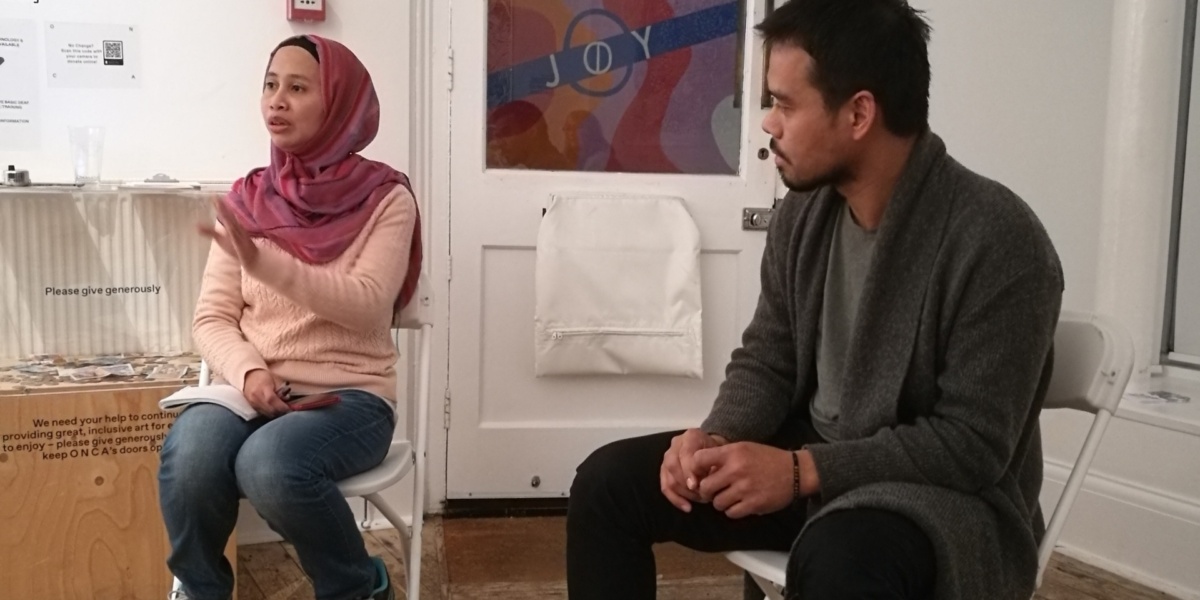On 28 November 2019, WEGO PhD Dian Ekowati hosted a film screening and discussion on forest communities and palm oil that explored loss of forest cultures and livelihoods in Borneo. The screening included conversations with artist Deru Anding and Professor Rebecca Elmhirst of University of Brighton’s Centre for Spatial, Environmental and Cultural Politics.
This was within the Generations programme for Lost Species Day 2019, with the series of films shown on the night exploring research by University of Brighton and CIFOR into issues related to care, gender and youth in the expansion of oil palm in Indonesia. The screening took place at the ONCA Gallery in Brighton, UK.
Dian presented the film with the following text:
My research will explore care in an oil palm community in West Kalimantan, Indonesia. Unpacking how the community sustains life after the oil palm monoculture crop or, some would call, ruin.
The movie that we will show today isn’t necessarily framed to answer the care question. But we can see clearly that care is an integral part of community’s everyday life. As the movie also show, I want to see more how the community juggle their care to children, family and environment after their oil palm drastically change their landscape. Or in other words, how oil palm alter the practice of care in the community’s everyday life. This question especially come up after seeing that most research are more on economics side. I want to see something that is beyond economy. And furthermore I want to see more on smallholders oil palm. I hope to be able to do start my field work next year sometime in April.
The movie is an outcome of gender and oil palm research we did on oil palm and gender in 2017. One of the question the research was trying to reveal how oil palm affect people life differently between women and men, different ethnicity and social class. An attempt after seeing many oil palm research rarely see gender. It was research collaboration between Becky from University of Brighton, colleagues from CIFOR and University of Indonesia. I was part of the team from CIFOR.
Back to the movie, it aims to provide insights on how complex the narratives of oil palm is. Community is not necessarily against oil palm per se. But they against the way in which they were incorporated into oil palm; on land acquisition, on employment condition for instance. On large scale oil palm company land acquisition for instance, the company has secured “right” over the and from the government before entering negotiation with the community. So the level of playing field is totally different there.
The first and second movie show how women employed by the same company experienced differ due to of their age, status of local or migrant, and term in employment. The third movie shows the local community aspiration to plant oil palm in their own plot.
As I mentioned before, care is there. I do not want to talk too much for now, let’s enjoy the movie. See it, feel it, and we can probably have a conversation on care in oil palm, on life under the oil palm canopy.
Further reading
Rebecca Elmhirst (Elmhirst, Siscawati, Basnett, & Ekowati, 2017)Elmhirst, R., Siscawati, M., Basnett, B. S., & Ekowati, D. (2017). Gender and generation in engagements with oil palm in East Kalimantan, Indonesia: insights from feminist political ecology. Journal of Peasant Studies, 44(6), 1137–1159. https://doi.org/10.1080/03066150.2017.1337002
Li, T. M. (2018). Evidence-based options for advancing social equity in Indonesian palm oil Implications for research , policy and advocacy. (208). https://doi.org/10.17528/cifor/006842


